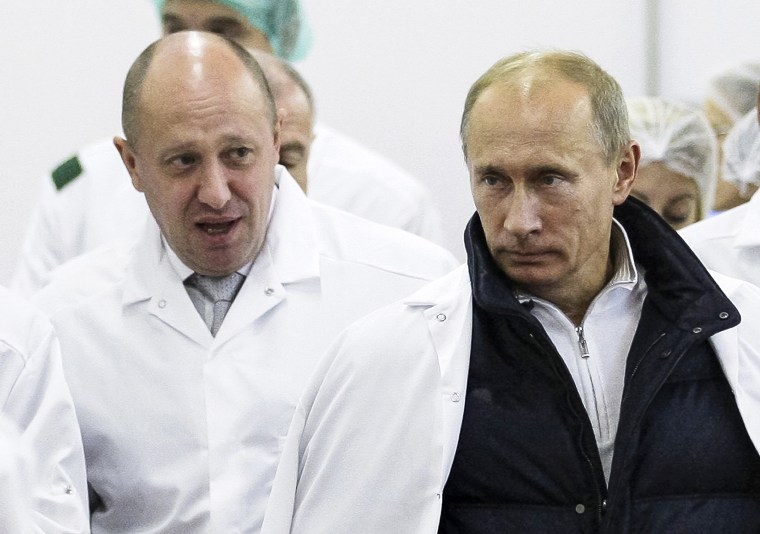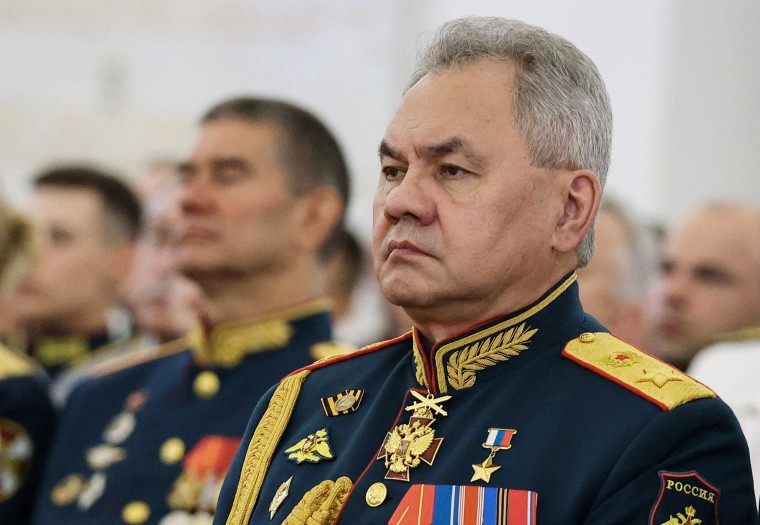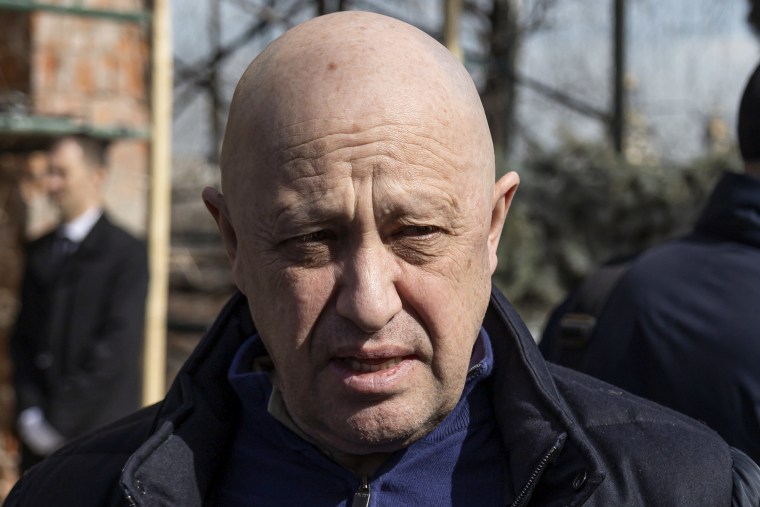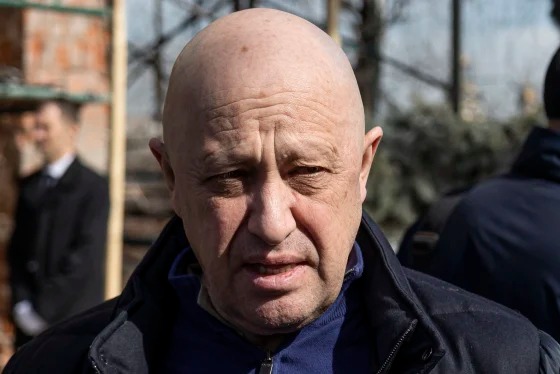Yevgeny Prigozhin used his close ties to Russian President Vladimir Putin to get rich and build a private army — then marched it on Moscow in a stunning challenge to his former boss’s rule.
The Wagner mercenary group chief now appears to have abandoned that rebellion for exile in Belarus, in a deal that leaves more questions than answers.
“Prigozhin would be naive to think this is over,” Michael A. Horowitz, a geopolitical and security analyst who is the head of intelligence at Le Beck consultancy, told NBC News.
Here’s a look at the man behind Russia’s biggest insurrection in its post-Soviet history, who went from prison to leading a military revolt that got within a hundred or so miles of Moscow.
Who knows what’s next.
How did Prigozhin build Wagner?
A St. Petersburg native like Putin, Prigozhin, 62, has one of the most varied biographies among the Kremlin elite.
He has admitted to serving 10 years in prison as a young man, though he has not said what for. He then grew a hot-dog stand into a chain of upscale restaurants, eventually drawing the Russian president’s attention and earning lucrative contracts to cater for public school and Kremlin events, which earned him the nickname “Putin’s chef.”
Over time, Prigohzin has catered to a variety of Putin’s other needs.
The Russian leader has sought to project influence around the world — from his neighbors in eastern Europe to the Middle East and Africa — and Prigozhin has helped him do it.
Around 2014, he created Wagner, according to a member who was recruited to the mercenary outfit by Prigozhin in its early days.
The Kremlin had just seized Ukraine’s Crimean Peninsula and had its sights on the eastern Donbas region, where a conflict was brewing after mass protests in Kyiv toppled a pro-Russian government. Suddenly, Putin had a war on his hands but did not want to send in regular army troops or call up a draft and face the possibility of Russians coming home in body bags.
So Prigozhin provided a solution.
He created a force of undesirables, people with military experience or a history of violence who were looking for jobs and may be less likely to be missed if they were killed. Wagner’s early operations in Ukraine were somewhat successful, and the conflict there continued without pushback from the Russian public.

The Kremlin has always denied any official military presence in eastern Ukraine, and while Prigozhin had previously refuted suggestions that he was connected to Wagner, last year he admitted on social media that he had created the group in 2014 and it had taken part in the conflict in eastern Ukraine.
Prigohzin’s next mission got much more attention, particularly from the U.S.
He founded the Internet Research Agency, the bot farm that interfered in the 2016 U.S. presidential election, polluting social media with disinformation, lies and skepticism about the legitimacy of the electoral process. Whether it swayed the outcome of the election remains an open question, but the U.S. intelligence community called it out and sanctioned Prigozhin, who said last year that he had interfered in U.S. elections and would continue to do so.
After that came Russia’s intervention in the war in Syria. Putin wanted to back President Bashar al-Assad and fight rebels backed by the West, but, again, do it off the books with few official Russian casualties. There, Wagner once again became instrumental to his efforts, and its fighters remain on the ground in the Middle Eastern country many years later.
Ever the entrepreneur, Prigozhin also expanded his operations into Africa.
In the Central African Republic, Prigohzin discovered that if Wagner propped up the weak government and helped it fight off a rebellion, the group could help itself to the impoverished country’s resources, mainly gold and blood diamonds.
Now the man who restarted his life with a single hot-dog stand had an army that was battle tested, experienced in disinformation, and perhaps most crucially, had its own independent source of funding.
From Bakhmut to Moscow: What sparked the rebellion?
With the full-scale invasion of Ukraine in 2022, Prigozhin was able and eager to again prove his value to Putin.
As the Russian army came up against surprisingly strong resistance, Wagner’s mercenaries came in handy in the bloodiest of battles. To bolster their ranks, Prigozhin turned to a place he knew well, promising convicts in Russian prisons freedom if they could survive more than six months on the front lines.
Wagner led the fighting for several key Ukrainian cities, including Bakhmut, an eastern city that became a key symbolic prize for Putin when he claimed to have seized it last month at the cost of thousands of men.
While he touted his mercenary forces as game changers in Ukraine and gradually entered the public spotlight, Prigozhin increasingly clashed with the military establishment in Moscow.
Using his well-oiled social media machine, Prigozhin emerged as a leading voice for hardliners and influential pro-war figures who were critical of the Kremlin’s approach to the war.
He accused the Defense Ministry and its head, Sergei Shoigu, of downplaying Wagner’s role and not supplying his fighters with sufficient ammunition, while blaming “incompetent” military leadership for Russia’s failures in Ukraine.

The bitter feud escalated in recent weeks as Moscow gave all private mercenary forces until July 1 to sign contracts with the Defense Ministry, which Prigozhin refused.
The standoff then exploded and Prigozhin launched an armed rebellion on Friday after alleging that the Russian army fired at his mercenaries.
While Putin initially seemed happy to let the internal squabbles play out, it appears even the Russian leader may have underestimated just how powerful and daring Prigohzin had become.
“I think what really triggered his decision to carry out a mad dash toward Moscow was the order issued earlier this month,” said Horowitz, referring to the demand that his fighters sign Defense Ministry contracts. Prigozhin saw this as a “prelude to disbanding” the private army he had worked for years to build, Horowitz said.
This was a signal for the mercenary chief that “Putin had sided with his enemies,” he said, adding that Prigozhin “may have felt that his own safety was no longer guaranteed, in the long run, and that if he did not act he would end up sidelined (at best) or dead. He had nothing to lose.”
Ahead of the rebellion, U.S. intelligence agencies had collected information that Prigozhin had been planning to challenge Russia’s senior military leaders and briefed congressional leaders about it last week, a source familiar with the matter told NBC News. They added that the intelligence revealed that Wagner had been amassing forces and weapons, although the intelligence wasn’t definitive.
What now?
In the end, it’s unclear what Prigozhin has gained.
He said Saturday he was within 120 miles of the Russian capital but decided to turn his troops around to “avoid spilling Russian blood.”
The Kremlin said Prigozhin would not face any charges and would go to Belarus, whose leader, Alexander Lukashenko, apparently helped broker the deal.
A big question that’s left hanging is what will happen to his Wagner troops?
The Kremlin has said it would not prosecute those fighters who took part in the rebellion, and that Wagner forces could still sign contracts with the Defense Ministry if they wanted to.
It’s possible that the estimated 25,000 Wagner fighters will be dispersed, “under suspicion,” across Russia’s regular army, said Lt. Gen. Ben Hodges, the former commander of the U.S. Army in Europe.

As for Prigozhin himself, the true nature of the resolution to the crisis remains unknown, as is the Wagner chief’s future.
But Putin is not known to allow his enemies to live quietly in exile, and his description of Prigozhin as a traitor suggests he viewed the revolt, like many analysts, as a direct threat to his rule.
“Going to Belarus may be an option — he seems to know and trust Lukashenko very well — but he would still be in danger there,” said Horowitz. “My best bet is that he will continue to operate in Ukraine, rather than Belarus, where he can justify maintaining relative freedom among men who are loyal to him.
“But either way, he has cornered himself by either going too far, or not going far enough,” Horowitz said. “If he lays low, he may still end up drinking poisoned tea, and if he is too loud, he will become even more of a liability for Moscow.”
Latest Stories
-
Gold Fields Ghana Foundation challenges graduates to maximize benefits of community apprenticeship programme
7 mins -
GBC accuses Deputy Information Minister Sylvester Tetteh of demolishing its bungalow illegally
18 mins -
Boost for education as government commissions 80 projects
29 mins -
NAPO commissions library to honour Atta-Mills’ memory
40 mins -
OmniBSIC Bank champions health and wellness with thriving community walk
42 mins -
Kora Wearables unveils Neo: The Ultimate Smartwatch for Ghana’s tech-savvy and health-conscious users
46 mins -
NDC supports Dampare’s ‘no guns at polling stations’ directive
49 mins -
Police officer interdicted after video of assault goes viral
1 hour -
KNUST’s Prof. Reginald Annan named first African recipient of World Cancer Research Fund
1 hour -
George Twum-Barimah-Adu pledges inclusive cabinet with Minority and Majority leaders
2 hours -
Labourer jailed 5 years for inflicting cutlass wounds on businessman
2 hours -
Parliament urged to fast-track passage of Road Traffic Amendment Bill
2 hours -
Mr Daniel Kofi Asante aka Electrician
2 hours -
Minerals Commission, Solidaridad unveils forum to tackle child labour in mining sector
2 hours -
Election 2024: Engagement with security services productive – NDC
2 hours

